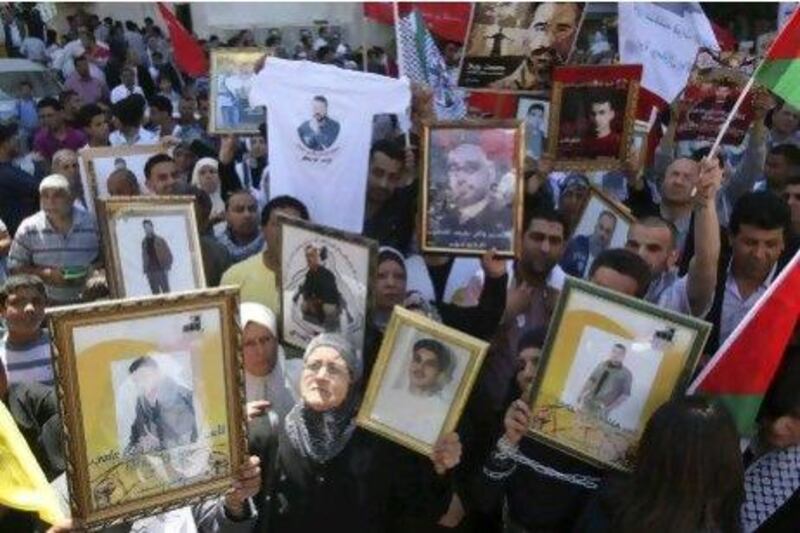TEL AVIV // More than 1,600 Palestinian prisoners went on indefinite hunger strike yesterday with 1,900 others declining meals for the day, the biggest protest against Israeli prison conditions in eight years, lawyers for the inmates said.
Hundreds of other Palestinian prisoners out of a total of 4,600 held by Israel might join the hunger strike in the coming days, according to the Ramallah-based Addameer group, which lobbies for the inmates, and lawyers who represent them.
The strike, taking place on the annual Palestinian prisoners' day that was marked by rallies and marches by thousands of Palestinians in the West Bank and Gaza, is the latest bid to shift media attention to what Palestinians claim are Israel's harsh prison conditions and torture of inmates.
The protests also highlighted deteriorating relations between Israelis and Palestinians amid a deadlocked peace process. It took place on the day the two sides held their first top-level meeting in more than 18 months.
Also yesterday the Islamic Jihad activist, Khader Adnan, was due to be released from an Israeli jail as part of a deal struck to end his record 66-day hunger strike in protest at being held without charge.
Mr Adnan has become a hero among Palestinians. His protest spurred others to launch hunger strikes, including two inmates who have refused food for 50 days and are in prison hospitals because of failing health, Addameer said.
Sahar Francis, the director of Addameer, said that the hunger strike was aimed at attracting international attention after Mr Adnan's case drew condemnation from abroad against Israel's actions.
"Israel for years claimed that the prison conditions were tied to [Israeli soldier Gilad] Shalit's capture. But now Shalit has been released and the situation for prisoners deteriorated," she said.
"That is the cause of the hunger strike now. The prisoners are hoping that after Khader Adnan, they can gather more media coverage on the international level."
The hunger strike that started yesterday was an effort to end Israel's policy of administrative detentions. The measure is aimed at preventing a person from committing an offence rather than as punishment for a crime already committed and can be repeatedly renewed for six-month periods with military court orders.
International law states that countries should use the policy only in exceptional cases but activists have said that Israel implements it as a "blanket measure" against Palestinians.
The Palestinian inmates also claim they face harsh prison conditions, including bans on family visits, extended periods of solitary confinement and restrictions on obtaining books and newspapers.
The inmates said their treatment has worsened since Israel last year released more than 1,000 Palestinian prisoners in return for Gilad Shalit, an Israeli soldier captured in 2006 by the Islamic group Hamas, despite Israeli pledges before the deal that their conditions would improve.
For example, Israel last year stopped allowing inmates to pursue university education in prison and seized their textbooks and academic papers, according to Addameer.
The association said that some prisoners were also severely beaten by prison security forces in recent months after resisting the prison's efforts to take DNA samples from all inmates for a DNA database.
Sivan Weizman, the spokeswoman for Israel's prison services, said that 3,500 Palestinian prisoners declined meals yesterday.
Ms Weizman also denied that the prisoner swap between Israel and Hamas included any pledges to improve conditions for Palestinian prisoners. She conceded that police "exercised their right to use force" with Palestinian prisoners when taking DNA samples.
The hunger strike is scheduled to include the highest number of prisoners since 2004, when hundreds of inmates stopped accepting meals for 17 days in protest at their conditions.
Last September, about 400 jailed Palestinians launched a hunger strike, some for as long as 21 days and the longest holding out for 26 days, demanding the abolishment of solitary confinement and other incarceration measures.





